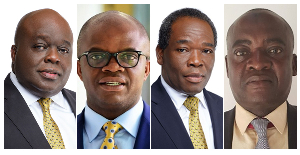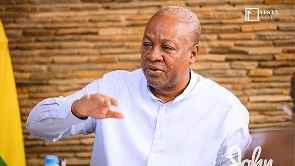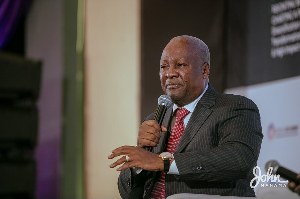Opinions of Monday, 8 January 2024
Columnist: Michael Agbesi Kelly
John Dramani Mahama’s Vision for 24-Hour Economic Policy: Preparing Ghana for the Fourth Industrial Revolution
As the world rapidly moves towards the Fourth Industrial Revolution, characterized by the fusion of digital, physical, and biological technologies, countries around the globe are striving to adapt and harness the potential of this transformative era.
In Ghana, former President and flagbearer of the National Democratic Congress (NDC), John Dramani Mahama has outlined a visionary plan to prepare the country for this revolution, centered around his 24-hour economic policy. This article explores Mahama’s vision and how it aims to position Ghana as a leader in the Fourth Industrial Revolution.
Understanding the Fourth Industrial Revolution
The Fourth Industrial Revolution is characterized by the convergence of various technologies, such as artificial intelligence, robotics, the Internet of Things, and big data. These advancements have the potential to revolutionize industries, economies, and societies, presenting both challenges and opportunities. Mahama recognizes the importance of embracing this revolution to ensure Ghana’s competitiveness in the global arena.
The 24-Hour Economic Policy
Mahama’s 24-hour economic policy is a comprehensive strategy designed to create an enabling environment for businesses to thrive and maximize productivity. It focuses on three key pillars: infrastructure development, digital transformation, and human capital development.
Infrastructure Development: Mahama’s plan emphasizes the need for robust physical infrastructure, including roads, railways, ports, and energy supply. Improving connectivity and reducing logistical bottlenecks will enhance Ghana’s attractiveness as an investment destination and facilitate the movement of goods and services efficiently.
Digital Transformation: Recognizing the transformative power of digital technologies, Mahama aims to continue his vision of digitizing key sectors of the economy. This includes promoting e-commerce, digital payments, and e-governance to streamline processes, improve efficiency, and enhance transparency. Mahama also plans to expand access to affordable internet connectivity, ensuring that all Ghanaians can participate in the digital economy.
Human Capital Development: To fully harness the potential of the Fourth Industrial Revolution, Mahama understands the importance of investing in human capital. His vision includes strengthening education and vocational training systems to equip Ghanaians with the skills necessary to thrive in a digital economy. This includes promoting STEM (science, technology, engineering, and mathematics) education, entrepreneurship, and innovation.
Benefits for Ghana
Mahama’s vision for a 24-hour economic policy holds several benefits for Ghana in the Fourth Industrial Revolution:
Economic Growth: By creating a conducive environment for businesses to operate, Ghana can attract more investments, stimulate economic growth, and create jobs. The integration of digital technologies will also foster innovation and entrepreneurship, driving productivity and competitiveness.
Inclusive Development: Mahama’s plan prioritizes ensuring that all Ghanaians can participate in and benefit from the digital economy. By expanding internet access and investing in human capital, marginalized communities can access new economic opportunities and bridge the digital divide.
Global Competitiveness: By embracing the Fourth Industrial Revolution, Ghana can position itself as a regional and global leader in digital transformation. This will enhance the country’s competitiveness, attract foreign direct investment, and foster collaboration with international partners.
Finally, former President John Dramani Mahama’s vision for a 24-hour economic policy is a forward-thinking strategy to prepare Ghana for the Fourth Industrial Revolution. By focusing on infrastructure development, digital transformation, and human capital development, Mahama aims to position Ghana as a leader in the digital economy.
By embracing this vision, Ghana can unlock the vast potential of the Fourth Industrial Revolution and ensure inclusive and sustainable development for its citizens.
Building the Ghana we want together.
Sports

He didn't necessarily agree - Otto Addo details 'long' conversation with Dede Ayew over latest snub
Business










